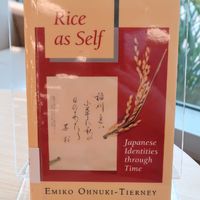Rice as self : Japanese identities through time
Item
-
Title
-
Rice as self : Japanese identities through time
-
Creator
-
Ohnuki-Tierney, Emiko
-
Date Issued
-
1993
-
Publisher
-
Princeton, N.J. : Princeton University Press
-
ISBN/ISSN
-
9780691021102
-
Language
-
English
-
Physical Description
-
xi, 184 p. : ill. ; 23 cm
-
Subject
-
National characteristics, Japanese
Rice -- Social aspects -- Japan
Japan -- Civilization
-
Description
-
1. Food as a Metaphor of Self: An Exercise in Historical Anthropology -- 2. Rice and Rice Agriculture Today -- 3. Rice as a Staple Food? -- 4. Rice in Cosmogony and Cosmology -- 5. Rice as Wealth, Power, and Aesthetics -- 6. Rice as Self, Rice Paddies as Our Land -- 7. Rice in the Discourse of Selves and Others -- 8. Foods as Selves and Others in Cross-cultural Perspective -- 9. Symbolic Practice through Time: Self, Ethnicity, and Nationalism.
In this engaging account of the crucial significance of rice for the Japanese, Emiko Ohnuki-Tierney examines how people use the metaphor of a principal food, such as rice, corn, or wheat, in conceptualizing themselves in relation to other peoples who eat other foods. Rice as Self shows how the Japanese identity was born through discourse with the Chinese, the first historical other. It shows how rice agriculture, in itself introduced from outside, was, ironically, appropriated as a dominant metaphor of the Japanese self. Since then rice and rice paddies have served as the vehicles for their deliberation of selves and others. Using for evidence such diverse sources as myth-histories of the eighth century, the imperial accession ritual, woodblock prints, novels, day-to-day discourse, and opinion polls, Ohnuki-Tierney shows that throughout Japan's history the cultural importance of rice has been deeply embedded in Japanese cosmology, both of the elite and common folk - rice as soul, rice as deity, and ultimately rice as self of the family, the community, and the nation at large. This, she emphasizes, has been so even though rice has not been the ""staple food"" of the Japanese, as is commonly held. Using Japan as an example, Ohnuki-Tierney proposes a new and complex cross-cultural model for the interpretation of selves and others. The historical transformations of the Japanese identity have been intimately related not only to their encounter with foreigners - the external other - but also to the process of the marginalization of minorities within Japanese society - the internal other - and of external others who ceased to be the privileged other. The model takes into account the power inequities both within and outside a given society. It has broad applications, especially to people for whom foreign ""cultural hegemony"" is part and parcel of a complex, often ambivalent, process of self-identity.


